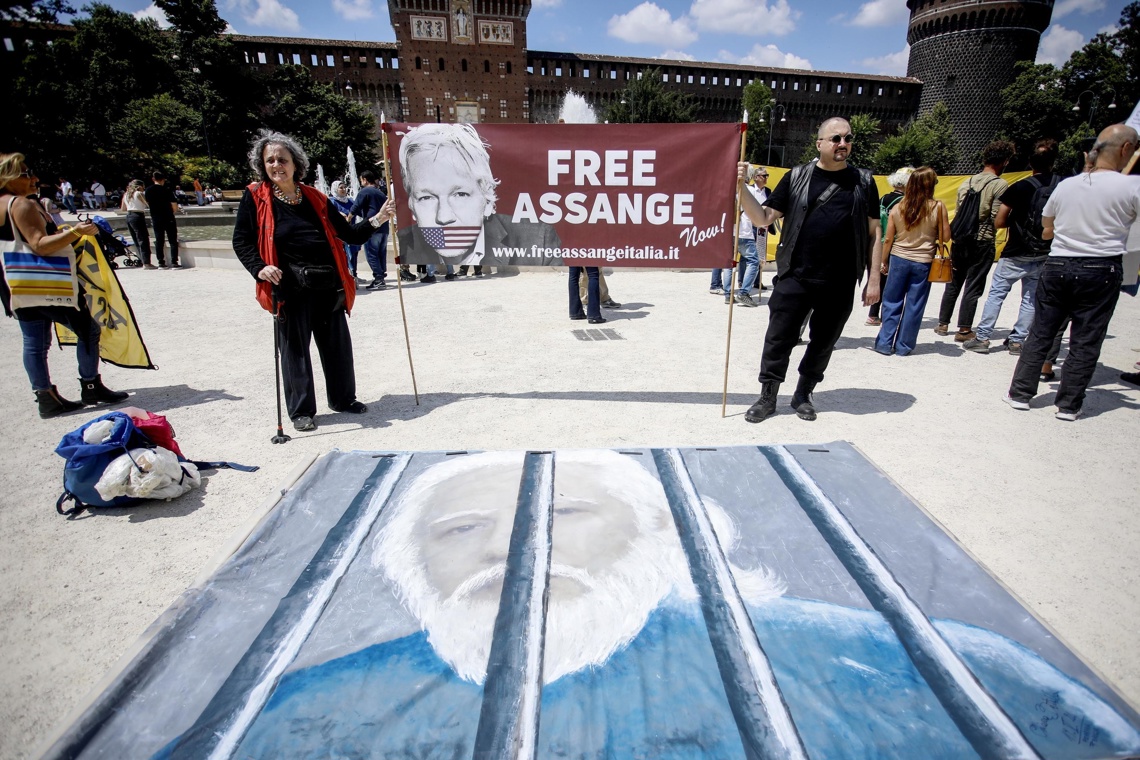WikiLeaks founder, Australian journalist Julian Assange, was released on Monday from a UK prison where he had been held for nearly 2,000 days, and will soon officially become a free man.
Assange, who shook the world in 2010 with his leaks about the American government and army, was released from prison, where he was awaiting his possible deportation, after reaching an agreement with the US Department of Justice.
The 52-year-old activist traveled to the island of Saipan, the US territory of the Mariana Archipelago, in the Pacific Ocean, where he will plead guilty on Wednesday to violating the US Espionage Act, international media reported.
This acceptance will result in a prison sentence of 62 months, which is equivalent to the time he spent in prison in the UK, and he will therefore be automatically released.
He is expected to return to Australia after the hearing in Saipan.
Assange agreed to plead guilty to one criminal count of conspiring to obtain and disclose secret US national defense documents, according to documents filed in the US District Court for the Northern Mariana Islands.
Had he been extradited to the United States, where a file of criminal charges were pending against him, the journalist could have faced a combined prison sentence of 175 years.
On Monday, the Supreme Court in London released Julian Assange, who spent more than five years imprisoned in a high-security prison, based on an arrest warrant issued by the United States on charges of publishing secret documents.
“Julian Assange is free. He left Belmarsh maximum security prison on the morning of 24 June, after spending 1,901 days there.
The letter added: “He was granted bail by the High Court in London and released at Stansted Airport in the afternoon, where he boarded a plane and left the UK.”
The agreement puts an end to his imprisonment, a period during which his physical and mental health suffered greatly, and will allow him to return to his country, Australia, ending a long legal saga.
Media bomb
In 2010, the WikiLeaks portal published more than 250,000 secret documents from the State Department related to Washington’s interventions in Afghanistan and Iraq and hundreds of thousands of communications from American embassies.
The critical volume of classified information had a first conciliatory channel, Chelsea Manninga former American military intelligence analyst born Bradley Edward Manning, who was also tried under the Espionage Act and sentenced to 35 years in prison.
Manning was pardoned by President Obama in 2017, but later returned to prison for refusing to testify before a grand jury about the WikiLeaks investigation.
In 2020, a judge decided to release her again, shortly after her legal team claimed she had attempted suicide in prison.
The scandal was considered the largest security breach of its kind in the history of the US Army. Assange was formally charged during the administration of former President Donald Trump and remained imprisoned in the United Kingdom, while an intense legal battle erupted with his extradition and release at the request of both sides.

The more than 700,000 documents eventually revealed included diplomatic cables and battlefield accounts, such as a 2007 video of a US Apache helicopter firing on suspected insurgents in Iraq. The attack led to the deaths of ten people, including two Reuters employees.
In total, WikiLeaks published 391,000 Pentagon documents on the Iraq war, 91,000 documents on the war in Afghanistan, and 250,000 diplomatic documents related to the campaign on Afghan soil.
Asylum at the Ecuadorian embassy
Assange’s discoveries revealed the identity of American collaborators and informants around the world.
Assange was first arrested in Britain in 2010 under a European arrest warrant, after Swedish authorities said they wanted to question him about allegations of alleged sex crimes that were later dropped.
The journalist then fled to the Ecuadorian embassy, where he remained in asylum for seven years, to avoid extradition to Sweden.
In 2019, the Ecuadorian government, headed by Lenin Moreno, ignored the right to asylum and allowed British police to storm UNHCR and drag the refugee out.

Assange was subsequently sent to Belmarsh maximum security prison in London, where he fought extradition to the United States through various legal sources.
Those five years of confinement are similar to the sentence imposed on Reality Weiner, an Air Force veteran and former intelligence contractor, who was sentenced to 63 months in prison after stealing classified materials and mailing them to a news outlet.
While living in Belmarsh, Assange married his partner, Stella, with whom he had two children while he was a refugee in the Ecuadorian embassy.
Now he will finally be able to reunite with his family and supporters, who have supported him for years and insisted on his release. The campaign has been joined by figures from all over the world, from progressive politicians to artists and intellectuals, who are now celebrating the news of Assange’s release.
Even Australian Prime Minister Anthony Albanese has repeatedly asked the United States to end the case, and in April, US President Joe Biden said he was “considering” the matter.
(With information from international media and agencies)

“Unapologetic tv specialist. Hardcore zombie trailblazer. Infuriatingly humble problem solver.”

